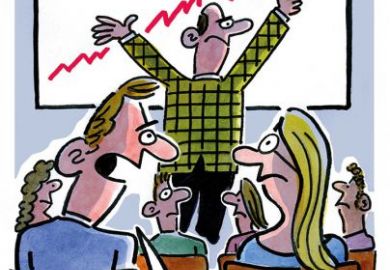
US late-night TV host Stephen Colbert has a theory that a “roller coaster is a perfect classroom”. By its very nature, he says, the ride’s adrenaline rush will “keep you awake even when learning something so dry as macroeconomics”. To test the theory, he invited Nobel laureate Paul Krugman, an expert in global economic theory, to give him a lesson in two minutes at 4Gs. “Our economy, like this roller coaster, is slowly going up. There’s no reason to believe it will ever drop,” said Mr Colbert, desperately attempting to cement the tired metaphor. The video, first shown on The Late Show, shows Professor Krugman remaining oddly calm while giving his three take-home pieces of advice to Mr Colbert on the “Nitro” ride at the Six Flags amusement park in New Jersey. As summarised by the CNBC website on 3 August, Professor Krugman replied “no” to the question of whether to buy gold, said “money good” and “print much more of it”, while adding that inflation “can be helpful”. Tweeting about the experience afterwards to his 4.5 million followers, Professor Krugman revealed: “It was indeed my first and I hope last time on a rollercoaster. I was feeling a bit sick afterwards, but apparently stayed coherent.”
Geraint Thomas never dreamed that it would be possible for him to win the Tour de France, which concluded on 29 July. For a start, he doesn’t even own a bicycle. But when he began to receive thousands of messages of congratulations – and some abusive ones, too – the Welsh university lecturer got an unexpected glimpse into the life of a sports champion. A lecturer in visual effects at the University of South Wales, Professor Thomas’ Twitter profile exploded when his namesake became the first Welsh native to win the world’s biggest cycling race. Within 24 hours, he had received “about 13,000 notifications” and was even tweeted mistakenly by the official Tour de France Twitter feed. He joins hundreds of members of the public who have found themselves mistaken for celebrities good and bad. “Welcome to the misdirected Twitter club. Another member of the gang,” messaged a Steve Bannon, who is regularly confused for Donald Trump’s former chief strategist.
Speaking of Mr Trump, a historian of tanning has taken the time to analyse the chosen colouring of the famously orange president. “It’s not surprising…that Trump believes altering his natural skin colour will improve his appearance and, hence, sense of self,” philosophised Tania Woloshyn, an associate fellow in history at the University of Warwick, for The Conversation on 1 August. “I’d argue that there is something very serious about Trump’s orange face – something serious about the superficial,” she warned. According to the academic, President Trump’s masking of his natural appearance offers signs of “weak and worrisome leadership”. Not wishing to paint anyone unfairly, we await evidence of this before making definitive judgement about Dr Woloshyn’s hypothesis.
Another excellent example of researchers focusing on a topic of mass public appeal was brought to us by psychologists at Ruhr University Bochum in Germany, attracting media coverage around the world last week. Surveying almost 1,000 mostly heterosexual couples, scientists conformed to every German stereotype by concluding that efficiency was key to great sex. Their paper, published in The Journal of Sex Research, concludes that women benefit from better sex lives if their partner is more conscientious, with a sense of “Pflicht”, or “duty” – a description that aligned with a tendency to be efficient and organised, according to one of the paper’s authors, Julia Velten. Conscientious people were disciplined and dependable, and they displayed planned behaviour more often than spontaneous behaviour, she said. Nothing says passion like presenting a partner with a calendar setting out the year’s sex sessions.
The Japanese are admired for many things – long life expectancy, care of the elderly – but one university’s policy on ensuring the “right” proportion of men and women ought not be adopted elsewhere. An internal investigation into Tokyo Medical University’s entrance procedures has revealed that the school systematically cut female applicants’ entrance exam scores for years in order to boost the number of male doctors, according to Japanese media reports this week. From 2011, it is alleged, the university began artificially reducing women’s exam scores to keep the proportion of women in the medical school at about 30 per cent. University sources were quoted as saying that the action was prompted by a “strong sense at the school” that many women quit medicine after graduating to get married and have children. The rage of thousands of applicants was neatly expressed in one woman’s Twitter post: “Japan is hell to women.”
Register to continue
Why register?
- Registration is free and only takes a moment
- Once registered, you can read 3 articles a month
- Sign up for our newsletter
Subscribe
Or subscribe for unlimited access to:
- Unlimited access to news, views, insights & reviews
- Digital editions
- Digital access to THE’s university and college rankings analysis
Already registered or a current subscriber?



